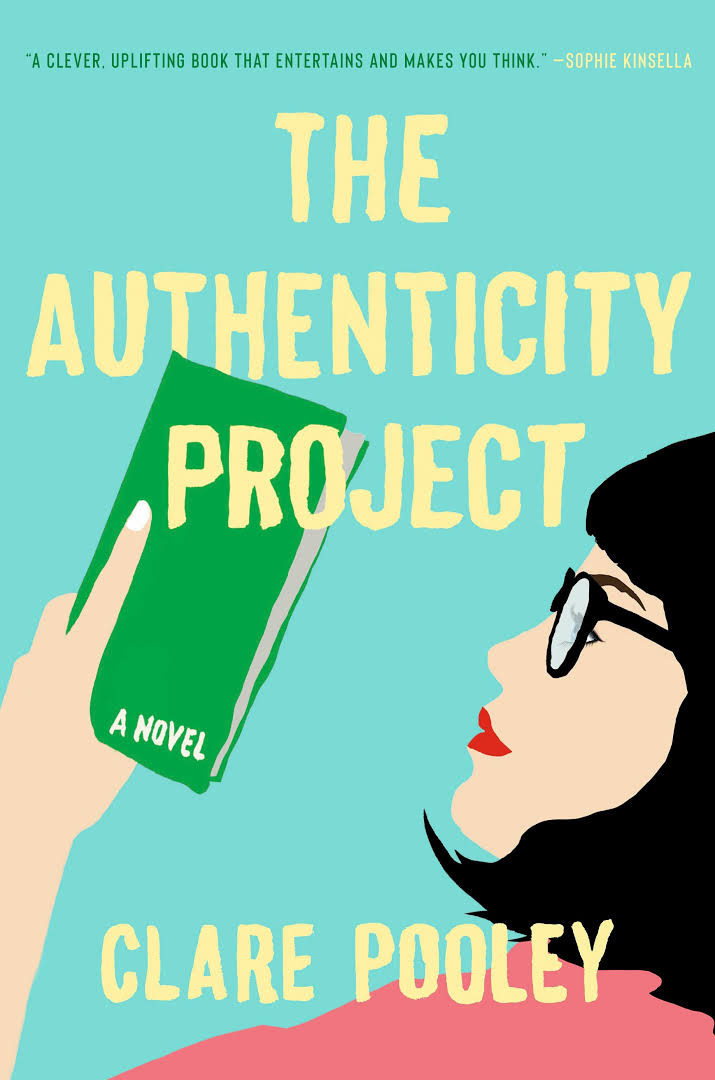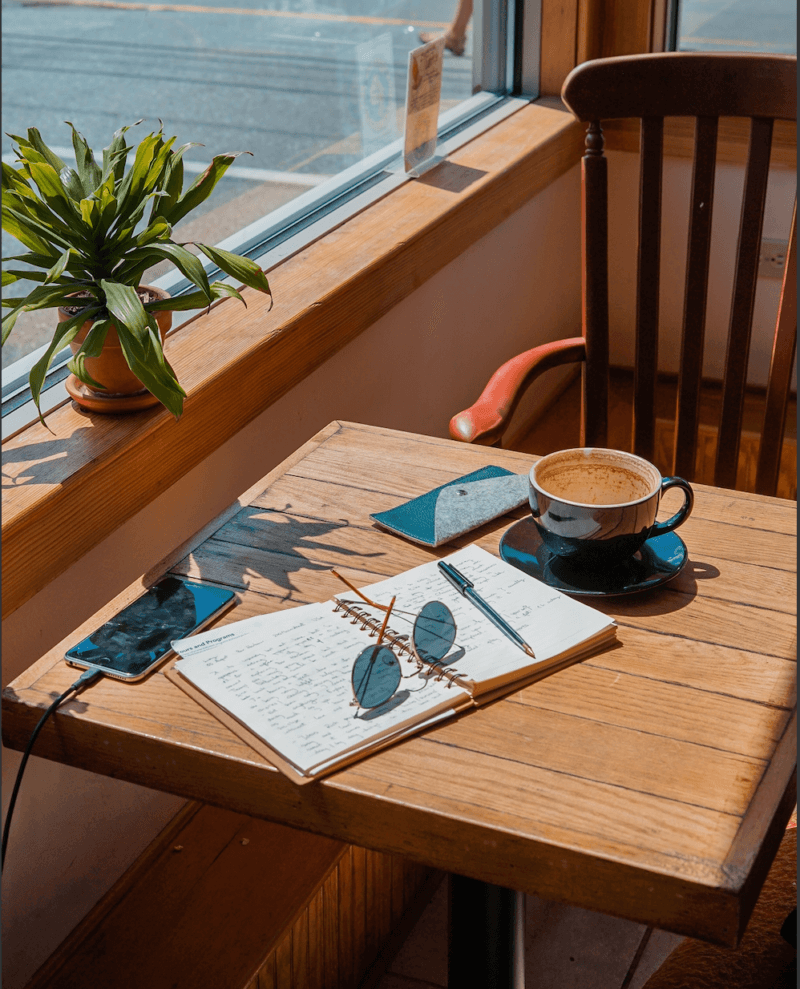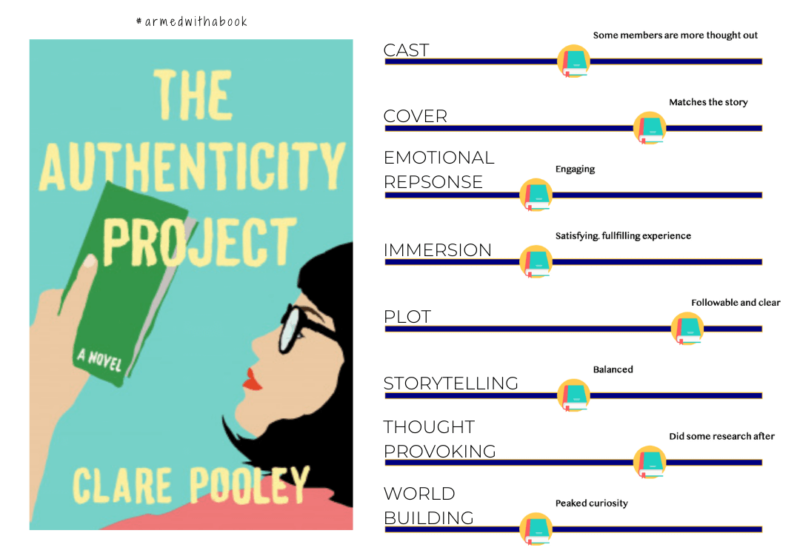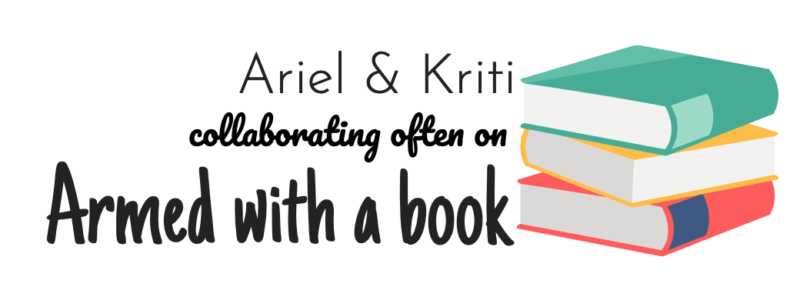In this world of social media and being surrounded by all sorts of messages, it is easy to get lost in the things that society expects of us and the way life is going. If we do not stop to ask ourselves important questions and get to know ourselves, we would never know how much of our existence is authentic. I finished reading The Authenticity Project last week by Clare Pooley and it brought some thoughts that I just had to tell Ariel about. Read on for the synopsis and our takeaways!

The story of a solitary green notebook that brings together six strangers and leads to unexpected friendship, and even love.
Julian Jessop, an eccentric, lonely artist and septuagenarian believes that most people aren’t really honest with each other. But what if they were? And so he writes–in a plain, green journal–the truth about his own life and leaves it in his local café. It’s run by the incredibly tidy and efficient Monica, who furtively adds her own entry and leaves the book in the wine bar across the street. Before long, the others who find the green notebook add the truths about their own deepest selves–and soon find each other In Real Life at Monica’s Café.
The Authenticity Project‘s cast of characters–including Hazard, the charming addict who makes a vow to get sober; Alice, the fabulous mommy Instagrammer whose real life is a lot less perfect than it looks online; and their other new friends–is by turns quirky and funny, heartbreakingly sad and painfully true-to-life. It’s a story about being brave and putting your real self forward–and finding out that it’s not as scary as it seems. In fact, it looks a lot like happiness.
The Authenticity Project is just the tonic for our times that readers are clamoring for–and one they will take to their hearts and read with unabashed pleasure.
Why I chose to read The Authenticity Project
Writing has always been an amazing tool to get to know myself better, and even in these advanced times where we can turn to a friend no matter where they are in the world, I find writing lets me talk to myself and get my thoughts in order in a way that a friend’s caring ear cannot. I loved the synopsis of this book and was really curious to know more about the lives of the people. Since Clare herself mentions in her introduction to the book and her author bio on Goodreads, many of the experiences in this book come from her life. I believe every person has something to teach me and that is why I picked up this book. This isn’t a genre that Ariel normally reads but we thought it would be neat to discuss it later. 🙂

Themes for Thought
Ariel felt that The Authenticity Project is a solid slice-of-life drama where a cast of characters maneuver themselves through their daily lives while interacting with people they would not normally have connected with if not for a journal they each find and write in their genuine truths. Each of the characters pick up The Authenticity Project and write in it thinking they’ve discovered their authentic self, but as the story progresses, the cast realize that their surface level problems have deeper voids they’re seeking to fill. Overall, the premise is solid and has potential to be a heartwarming story about personal growth and authenticity.
We discussed four main themes related to this book:
On Vulnerabilities
It takes a lot of courage to admit to ourselves the vulnerabilities we have as well as to acknowledge them to others. It is easier to tell it to strangers sometimes because they don’t know us and might be more likely to side with our point of view for a situation. Maybe that is why The Authenticity Project journal offered cathartic release to the writers. Hazard and Monica could finally admit that they did not want to be alone and are struggling with their past and future respectively. Alice could admit that she was dealing with alcoholism and failing to be a good mom, even though no one had said that to her. These characters had their surface-level problems to deal with, but they were unwilling to address the deeper feelings of loss and loneliness.
It can be easy to address the obvious problems in our lives, but much more difficult to have an honest look at ourselves.

On Social Media
People turn to social media not to see the mundane everyday life of others. We look through our friends’ and celebrities’ stories to find what we might not have. Yes, it feels amazing to make connections when you find someone on social media reading the same book as you, but ultimately, whatever we choose to post on social media is usually very catered to an audience to illicit a certain response. For example, I post photos of books on my social media to connect with fellow book lovers, get them to read the book too or share their opinion on the book. I do not post about everything that happens in my life – getting up, getting dressed, having breakfast, taking the bus… are you bored already?
My point is that social media posts are well thought out – we post what we know will create larger interactions with others online (for example–this can be anything from a small-scale post that we know is relatable to those in our social circle to larger controversial posts that gather large attention on all sides of the discourse). Don’t get me wrong, posting to a larger following for interaction isn’t inherently bad! It only becomes a problem when we lose ourselves in the inauthenticity of it all. And others, as followers and fans, we play into this game. We let ourselves imagine that the person who is posting leads exactly the life they are posting about, and then sometimes feel bad that we don’t have that life! But that is not true.
Every person is more than what they project online – they have their own internal struggles and journey to discover who they are, most of which will never make it to social media. Being authentic is knowing that there are always other sides to a story, and no matter what image we project to the public, changing that image when we don’t think it is us anymore. Alice in The Authenticity Project feels the burden of maintaining a social media influencer presence only to find that it is pulling her down. Ultimately, the way to be authentic is to find a passion where you can be true to yourself and do not care about what others think.
If you have not seen Taylor Swift’s documentary on Netflix yet, do go check it out! Taylor Swift is one of my favorite artists and I have grown up listening to her songs. Her struggle to find herself, often because of the media backlash and situations created by people she did not even know, lead her to express herself in her later works, Reputation onwards, where she knows who she is and what she is fighting for. I love and admire her for that!

On Authenticity in being Inauthentic
One of the coolest parts about this story was how taking part in The Authenticity Project and writing in the journal, knowing about the people who had already written in it, made Riley feel like he was being inauthentic. As my friend, Lauren, pointed out when I was telling her about this book:
There is authenticity in recognizing that one is being inauthentic.
When we identify those moments when we are putting on a face or going against our values, we are being true to ourselves. Those moments are important in defining how we proceed going forward, highlighting the parts of us we want to work on and change. They also point to the act of being mindful about what we are thinking and how we are behaving.
On Influencing Others
As much as we would like to go about life the way we want, we live in a society – what others do and say affects us. It might not be to a large extent all the time, but the little things that our friends do for us without us telling them, a smile from a stranger, or a surprise cuddle from a cat all contribute to how we feel. Just like other people and beings influence how we feel, we have the power to affect others as well. We choose to have a positive or negative effect, based on our own actions. When Monica first reads the journal and realizes how lonely Julian is, she finds a way to connect with him and bring the spark of his passion for painting back, even though she doesn’t know him very well.
Even though we cannot go around life thinking about how each and every decision affects someone else, when we genuinely and thoughtfully take a step to help someone, we are not only living by our true values and being authentic to the world and society we want to build, but also spreading some joy and happiness, which only helps us be more content in life.
Overall, I enjoyed this book. Ariel also liked it and for both of us it was a cozy read. We are thankful to the publisher and author for providing us a complimentary copy of this book through NetGalley in exchange for an honest review.
** The Authenticity Project is out in stores on the 4th February so go preorder your copy now, if you are interested! **
Amazon Print
Amazon Kindle


Cover image: Photo by Toa Heftiba on Unsplash, Image of concrete building from Unsplash as well.
Miss Americana Image from KUTV.

Be First to Comment